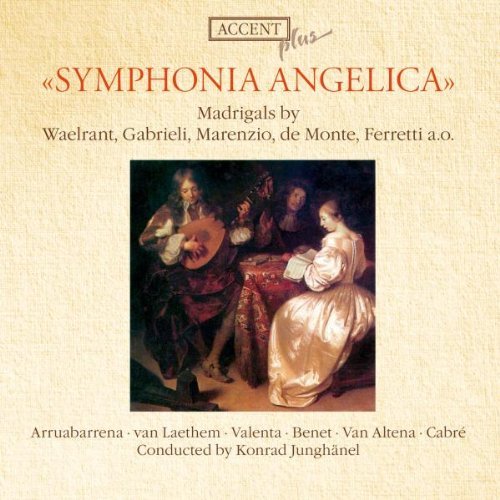
Maite Arruabarrena, Konrad Junghanel - Symphonia Angelica (1998)
BAND/ARTIST: Maite Arruabarrena, Konrad Junghanel
- Title: Symphonia Angelica
- Year Of Release: 1998
- Label: Accent
- Genre: Classical, Vocal
- Quality: FLAC (image+.cue,log,scans)
- Total Time: 68:55
- Total Size: 287 Mb
- WebSite: Album Preview
Tracklist:
Symphonia Angelica
Hubert Waelrant
01. Tra romor di tamburi
Cornelius Verdonck
02. Donna bella e gentile
Hubert Waelrant
03. Vorria morire a 4
04. Vorria morire a 6
05. Mi voglio fare
Luca Marenzio
06. Amor poiché non vuole
07. Madonna mia gentil
08. Rose bianche e vermiglie
Philippus de Monte
09. Ochi vaghi amorosi
Giovanni de Macque
10. Vorria saper da voi
11. Bacciami vita mia
Girolamo Conversi
12. Io canterò
Giovanni Gastoldi
13. Un novo cacciator
Giovanni Ferretti
14. Mirate che m'ha fatto
Luca Marenzio
15. Dissi a l'amata
Giovanni Ferretti
16. Occhi, non occhi
Giovanni Nanino
17. Mentre ti fui si grato
Giovanni Ferretti
18. Basciami vita mia
19. Un tempo sospirava
Hippolito Baccusi
20. Io son bell' e delicata
Andrea Gabrieli
21. Sonno diletto e caro
22. Cinto m'avea tra belle e nude
23. Come voi tu ch'io viva
24. Clori a Damon dicea
Performers:
Maite Arruabarrena, Katelijne Van Laethem - Soprano
Mira Valenta, Alto
Josep Benet, Marius van Altena - Tenor
Josep Cabré - Bass
Titia de Zwart,Anneke Pols, Richte van der Meer, Viols
Konrad Junghänel - Conductor and Lute
Symphonia Angelica
Hubert Waelrant
01. Tra romor di tamburi
Cornelius Verdonck
02. Donna bella e gentile
Hubert Waelrant
03. Vorria morire a 4
04. Vorria morire a 6
05. Mi voglio fare
Luca Marenzio
06. Amor poiché non vuole
07. Madonna mia gentil
08. Rose bianche e vermiglie
Philippus de Monte
09. Ochi vaghi amorosi
Giovanni de Macque
10. Vorria saper da voi
11. Bacciami vita mia
Girolamo Conversi
12. Io canterò
Giovanni Gastoldi
13. Un novo cacciator
Giovanni Ferretti
14. Mirate che m'ha fatto
Luca Marenzio
15. Dissi a l'amata
Giovanni Ferretti
16. Occhi, non occhi
Giovanni Nanino
17. Mentre ti fui si grato
Giovanni Ferretti
18. Basciami vita mia
19. Un tempo sospirava
Hippolito Baccusi
20. Io son bell' e delicata
Andrea Gabrieli
21. Sonno diletto e caro
22. Cinto m'avea tra belle e nude
23. Come voi tu ch'io viva
24. Clori a Damon dicea
Performers:
Maite Arruabarrena, Katelijne Van Laethem - Soprano
Mira Valenta, Alto
Josep Benet, Marius van Altena - Tenor
Josep Cabré - Bass
Titia de Zwart,Anneke Pols, Richte van der Meer, Viols
Konrad Junghänel - Conductor and Lute
This disc, originally made in 1989 and led by early music pioneer Konrad Junghänel, stands up well and was a strong candidate for reissue. The Symphonia Angelica of the title was a printed madrigal collection issued by Hubert Waelrant, who was also a composer and included his own effort, Tra romor tamburi. That piece, and all the others, are Italian madrigals, and the disc provides a fair cross-section of Italian madrigals as they became famous across Europe and in England, where they stimulated the creation of the works still taken up every year by high school choirs and glee clubs. The madrigals are mostly in four or five parts, and Junghänel varies his forces nicely; some are accompanied with viols or his own lute, while others are sung unaccompanied, and the group slightly shifts with each new work -- an eminently reasonable solution. The singers involved aren't virtuosi but blend nicely, with accurate intonation. The repertoire is the most attractive feature of the performance.
Classical | FLAC / APE | CD-Rip
As a ISRA.CLOUD's PREMIUM member you will have the following benefits:
- Unlimited high speed downloads
- Download directly without waiting time
- Unlimited parallel downloads
- Support for download accelerators
- No advertising
- Resume broken downloads


